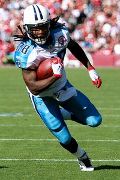Every passion and hobby has an individual genesis, a moment when one is introduced to an activity or subculture that they may pursue for the rest of his or her lives.
Several years ago, my then-technophobic dad asked me exactly where the Internet was (the man is a doctor, mind you) and I told him that it was housed in a building outside of Cleveland. These days, after years of acclimation, the guy is the Gordon Gekko of eBay, placing bids on wooden gnomes, classic beer bottles and 5-irons (unrelated hobbies) with precision.
The point is that we all have the potential to evolve from rookie to expert quite quickly, particularly thanks to all of the amazingly accessible resources at our disposal.
Fantasy football may seem like a complicated and consuming activity from the outside, but once you're immersed you'll find it to be a generally easy game to navigate. My duty here is to illustrate the framework of fantasy football and introduce what could become an enjoyable, empowering and enduring hobby for you.
The Basics
Fantasy football participants are "owners" and "managers" of teams that engage in competitive leagues, accruing "fantasy points" based on the statistics of real football players. The vast majority of leagues are scored on a weekly basis, matching up teams in a head-to-head scenario in a rotating schedule. The teams in the end with the best records make it into the fantasy postseason (often held from Weeks 14-17 of the NFL schedule).

The goal is to collect the most productive players across a variety of positions. In a standard league, you are asked to fill out your starting roster with a quarterback, two running backs, one "flex" player (a slot for either a running back or wide receiver), two wide receivers, one tight end, one team defense/special teams (you draft the entire Pittsburgh Steelers defense and special teams, for example) and a kicker. To fill out your roster with depth you are afforded seven bench spots. This may seem like an absurd number of players to manage at once, but as the season wears on you'll wish you had even more room on your roster.
Fantasy leagues can adhere to any variety of rules and settings desired, but for the sake of simplicity, I suggest perusing the scoring settings in the ESPN standard leagues. Before you join any league, it's imperative to have a sound understanding of the scoring and roster settings so that you can capably build a successful team. The players make up a marketplace, so consider the players as commodities; that their value fluctuates based on the rules and regulations of a given league. In the Draft Kit you'll find a number of helpful scoring-specific guides.
The draft marks the beginning of the fantasy football season. Often held in the weeks leading up to the NFL season, the draft is when you initially construct your roster. Most leagues are comprised of 10 to 12 teams and the drafts are conducted in either "snake" or "auction" formats. Pick by pick, you build your team and fill out your roster. Draft day for many leagues has become a holiday of sorts, with spirited trash-talking and camaraderie becoming core traditions. Once you get a good grasp on the elemental rules and settings in fantasy, take a few minutes to read Christopher Harris' valuable take on drafting strategies.
Playing the Game
Clearly, you play to win the game. Fantasy, in every permutation, is about the numbers. As is true on the field, maximizing production from every starting position on the roster is the goal. While the actual players risk life and limb for extra yards, we risk ego, pride and semi-public humiliation for fantasy glory.

The question then, is how does one become a deft fantasy manager?
The road to imaginary glory (but glory, nonetheless) begins, of course, with a concrete understanding of the parameters of the league you are entering. Once this foundation is established you can focus on becoming the best manager possible, which requires taking on several different roles.
Scout: During the spring and summer months, you are tasked with collecting information on injuries, position battles, free agency and the NFL draft. Don't let this overwhelm you. You might be relieved to know that during the spring and summer months ESPN Fantasy and the rest of the fantasy content industry are also tasked with analyzing these events and placing them in a fantasy context. The summer is the time to gauge where value lies amongst the collective of football players. Read up and read often and jump into some mock drafts in order to get accustomed to the process while also refining your understanding of the marketplace for talent.
General Manager: You've already spent some time over the summer mocking it up and reading and otherwise general fantasy "nerdery." On draft day, you are the war room. You and you alone are building the squad. While it takes several hours to conduct a draft, it can go by quite rapidly. Having a few cheat sheets and some handwritten notes on the side while drafting can help focus your decision process. While it's hard to envision this in August and September, the makeup of a fantasy roster often changes somewhat by November and December, given the attrition of the NFL season. This means that having valuable backup players is often just as much a determinant of your team's success as how your "stars" perform. Put some time into learning about some of the value players, or "sleepers" as the cool kids call them.
Some of the most important work continues post-draft in regards to managing the roster, as transactions on the waiver wire (collection of players who are not owned in a specific league) and pursuing trades with other managers can impact your season just as much as the draft process. Much like in the real thing, the job of a GM is never quite finished.
Coach: If the GM's role is to evaluate the roster in regards to the entire market for players, the coach is asked to consider the best decisions for each given week. In this role, you must choose which players to start and bench given your limited slots for starters. "Coaching" a team is essentially a mixture of informed decisions and flat-out gut calls. Some start/sit decisions truly can become dilemmas and induce handwringing and pacing. But much like a golfer would say, the "stress" of it all is also what affords such a grand payoff when you excel.
In the end, the payoff is that you are simply in charge. An effective blend of these roles and a conscious eye on merely enjoying the fantasy and football seasons will make for the best experience.
Striking a balance
Fantasy football information is everywhere, sometimes there's seemingly too much. We all get advice on basically everything (especially those of us who are married). From the guy in line at the supermarket to the ESPN analyst, opinions on fantasy football are endless. The real task is digesting all of these different angles and resources and forming your own strategy for not only that upcoming season but throughout your days playing fantasy football.
Jim McCormick is an IDP and fantasy football analyst for ESPN.com, as well as the editor and publisher of BLITZ Magazine, a print and online publication covering football from prep to pro.
